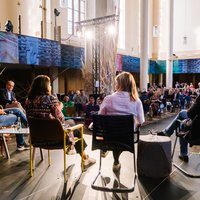Beethoven and Kant. They are two names known beyond the boundaries of their respective fields. But what was the extent of their influence on each other? The International Kant Congress held a panel discussion on this question at Beethovenfest 2024.
Livestream from Sep 13 2024
Panel discussion: »Beethoven and Kant«

For us, 2024 was naturally defined by Beethoven's Ninth Symphony and the »Missa Solemnis«. However, there was another significant anniversary to commemorate: Immanuel Kant's 300th birthday.
Fittingly, this year's International Kant Congress took place in Bonn, providing an opportunity to explore the connection between these two influential figures.
While it is questionable whether Kant was familiar with Beethoven and his music, the former's radically new way of thinking undoubtedly influenced the young Beethoven in Bonn during the Enlightenment.
This can be seen indirectly in Beethoven's open world view and is also documented in various sources. For example, in a conversation booklet – a conversation aid for the deaf composer – Beethoven noted: »The moral law in us and the starry sky above us«, followed by »Kant!!!«. Although Beethoven did not quote the great thinker directly, he was clearly thinking about and discussing his ideas.
Our group took this as the starting point for an exciting discussion, during which not everyone agreed all the time – as befits a good discussion!

The panel discussion was moderated by the musicologist Hans-Joachim Hinrichsen. His research on Beethoven's »ideal contemporaneity«, published under the title »Ludwig van Beethoven – Musik für eine neue Zeit« (»Music for a New Era«), made him the perfect choice for the role.
Also on the podium was Christoph Horn, professor of philosophy and co-organiser of the Kant Congress. As well as researching the philosophy of antiquity, he also studies practical philosophy, particularly the work of Immanuel Kant. He was joined by Julia Ronge, a curator at the Beethoven House who is very familiar with Beethoven's correspondence and writings. The third panellist was Tim Kunze, a member of the Kant department of the Lüneburg State Museum which is currently being established. Pianist Amadeus Wiesensee completed the panel, contributing his artistic perspective as well as musical examples. His philosophy degree is, of course, a welcome addition!
To the event
- , LVR-LandesMuseum Bonn
Beethoven and Kant
Prof. Dr. Christoph Horn, Dr. Julia Ronge, Moderation: Prof. Dr. Hans-Joachim Hinrichsen
